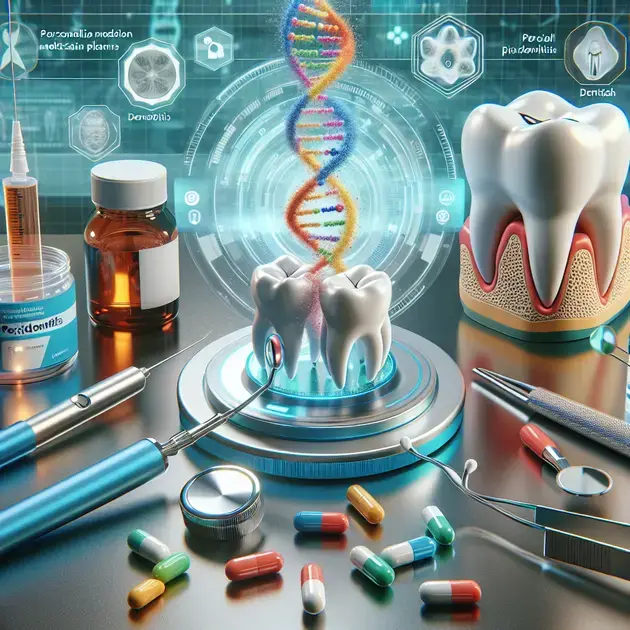When it comes to managing periodontitis, effective medication plays a crucial role in controlling the progression of this serious gum infection. With advancements in dental research and technology, there are now various medications available that can help combat the bacteria causing periodontitis and improve oral health.
From antibiotics to antimicrobial mouth rinses, the options for managing periodontitis with medication have expanded in recent years. It’s important for patients to work closely with their dentist to determine the most suitable medication regimen based on the severity of their condition and individual needs.

Medication Options for Periodontitis Management
When it comes to managing periodontitis, there are various medication options available to help control the condition effectively. These medications can be prescribed by your dentist or periodontist, and they can complement your regular oral hygiene routine to improve the health of your gums. Here are some common medication options for periodontitis management:
1. Prescription Antibiotics
Your dentist may prescribe antibiotics to help combat the bacteria causing periodontitis. These antibiotics can come in the form of pills, mouth rinses, or gels. It’s important to follow your dentist’s instructions carefully when taking antibiotics to ensure they are effective.
2. Antiseptic Mouthwashes
Antiseptic mouthwashes can help reduce the amount of bacteria in your mouth, which can contribute to the development of periodontitis. Using an antiseptic mouthwash as part of your daily oral hygiene routine can help control the condition and prevent it from worsening.
3. Enzyme Suppressants
Enzyme suppressants work by inhibiting the production of enzymes that break down gum tissue. By using enzyme suppressants, you can help preserve the health of your gums and prevent further damage caused by periodontitis.
4. Anti-inflammatory Medications
Anti-inflammatory medications can help reduce the inflammation and swelling associated with periodontitis. Your dentist may recommend using over-the-counter or prescription anti-inflammatory drugs to help manage the symptoms of the condition.
5. Bone Growth Stimulators
In severe cases of periodontitis where bone loss has occurred, your dentist may recommend the use of bone growth stimulators. These devices help promote the regeneration of bone tissue in the affected areas, restoring the structure and stability of your teeth and supporting structures.
Collaborating with Your Dentist for Effective Treatment
Effective treatment of periodontitis requires close collaboration between you and your dentist. By working together, you can develop a comprehensive treatment plan that addresses your individual needs and helps you achieve optimal oral health. Here’s how you can collaborate with your dentist for effective treatment:
1. Regular Dental Visits
Schedule regular dental visits with your dentist to monitor the progress of your periodontitis treatment. Your dentist can track changes in your gum health, adjust your treatment plan as needed, and provide guidance on maintaining good oral hygiene practices.
2. Open Communication
Communicate openly with your dentist about any symptoms or concerns you may have regarding your periodontitis. Your dentist can provide valuable insights and recommendations based on your feedback, helping tailor your treatment plan to suit your specific needs.
3. Follow-Up Care
Follow your dentist’s instructions for post-treatment care to ensure the effectiveness of the medications and procedures prescribed. By following up with recommended maintenance appointments and at-home care routines, you can support the success of your periodontitis treatment in the long term.
4. Lifestyle Modifications
Your dentist may recommend lifestyle modifications to support the management of periodontitis, such as quitting smoking, improving dietary habits, and managing stress. Making positive changes to your lifestyle can complement your treatment plan and enhance the overall health of your gums.
5. Compliance with Treatment
It’s essential to comply with your dentist’s recommended treatment plan to achieve the best outcomes in managing periodontitis. Take medications as prescribed, attend follow-up appointments, and maintain good oral hygiene practices to support the effectiveness of the treatment and prevent recurrence of the condition.
Advancements in Medication for Periodontitis Control
Recent advancements in medication for periodontitis control have revolutionized the way this condition is managed, offering innovative solutions for improved outcomes. These advancements leverage cutting-edge technologies and scientific research to enhance the effectiveness of periodontitis treatment. Here are some of the notable advancements in medication for periodontitis control:
1. Targeted Drug Delivery Systems
New drug delivery systems allow for targeted and sustained release of medications directly to the affected areas in the gums. These systems ensure optimal absorption of the medication and prolonged therapeutic effects, improving the efficiency of treatment and reducing the frequency of application.
2. Regenerative Therapies
Regenerative therapies utilize biologically active agents to stimulate the regeneration of damaged gum tissue and supporting structures. By promoting tissue repair and growth, these therapies help restore the health and function of the gums, offering a promising approach for the treatment of periodontitis.
3. Microbiome Modulation
Advancements in microbiome modulation focus on balancing the microbial communities in the oral cavity to promote a healthy oral environment. By targeting specific bacteria associated with periodontitis, these interventions help restore microbial equilibrium and prevent the progression of the condition.
4. Personalized Medicine
Personalized medicine approaches tailor treatment strategies to individual patient characteristics, such as genetic predisposition and microbiome composition. By customizing medication regimens based on patient-specific factors, personalized medicine aims to optimize treatment outcomes and improve the overall management of periodontitis.
5. Nanotechnology in Drug Delivery
Nanotechnology applications enable the precise delivery of medications at the nanoscale level, enhancing their bioavailability and therapeutic effects. By utilizing nanocarriers to transport drugs to targeted sites in the gums, nanotechnology holds promise for improving the efficacy of periodontitis medications and reducing potential side effects.

**The Role of Genetic Testing in Personalized Medication Plans for Periodontitis Management**
Genetic Testing Benefits
Genetic testing plays a crucial role in creating personalized medication plans for periodontitis management. By analyzing an individual’s genetic profile, healthcare providers can identify specific genetic markers associated with periodontal disease susceptibility. This information allows for the customization of treatment strategies, ensuring a more targeted and effective approach to managing the condition.
Furthermore, genetic testing can help predict treatment responses and potential side effects, enabling healthcare professionals to tailor medication plans to each patient’s unique genetic makeup. This personalized approach not only maximizes the efficacy of the treatment but also minimizes the risk of adverse reactions.
Overall, the integration of genetic testing into personalized medication plans for periodontitis management offers a promising avenue for improving patient outcomes and enhancing the overall quality of care in dental healthcare settings.
Implementing genetic testing in personalized medication plans can lead to more precise and efficient treatment delivery, ultimately benefiting both patients and healthcare providers in the management of periodontitis.
Medication and Dental Procedure Integration
Integrating medication with dental procedures is essential for maximizing treatment efficacy in periodontitis management. This holistic approach involves coordinating medication schedules with dental appointments to ensure optimal results and patient compliance.
By combining medication and dental procedures, healthcare providers can address both the systemic and local aspects of periodontitis, targeting the root cause of the disease while also addressing its symptoms. This integrated approach not only enhances the effectiveness of treatment but also improves patient satisfaction and overall treatment outcomes.
Furthermore, coordinated medication and dental procedure integration can streamline the treatment process, reducing the number of appointments and overall treatment duration. This not only benefits patients by minimizing disruptions to their daily lives but also optimizes resource utilization in dental healthcare settings.
Overall, the integration of medication and dental procedures in the management of periodontitis is essential for achieving comprehensive care and maximizing treatment efficacy while promoting patient comfort and convenience.
Innovative Approaches to Enhance Patient Adherence
Enhancing patient adherence in personalized medication plans for periodontitis management is a critical aspect of ensuring treatment success. Innovative approaches, such as patient education programs, remote monitoring technologies, and personalized medication reminders, can help improve patient engagement and adherence to treatment regimens.
By educating patients about the importance of medication compliance and the role of personalized treatment plans in managing periodontitis, healthcare providers can empower patients to take an active role in their oral health. This increased awareness can lead to better treatment outcomes and long-term oral health benefits.
Remote monitoring technologies, such as mobile apps and wearable devices, offer patients convenient tools to track their medication intake and dental appointments, providing real-time feedback and motivation to adhere to their treatment plans. These technologies not only improve patient engagement but also enhance communication between patients and healthcare providers, leading to more personalized care.
Personalized medication reminders, tailored to each patient’s preferences and daily routines, can help reinforce medication compliance and adherence. By integrating these reminders into patients’ daily lives, healthcare providers can increase treatment effectiveness and support patients in achieving optimal oral health outcomes.
Conclusion
In conclusion, genetic testing plays a pivotal role in tailoring personalized medication plans for effective periodontitis management. By leveraging an individual’s genetic profile, healthcare providers can pinpoint specific genetic markers linked to periodontal disease susceptibility, enabling a customized treatment strategy that is precise and impactful.
Moreover, the integration of genetic testing in personalized medication plans not only enhances treatment efficacy but also reduces the chances of adverse reactions by predicting treatment responses and potential side effects. This proactive and personalized approach marks a significant step forward in improving patient outcomes and elevating the standard of care in dental healthcare settings.
Additionally, the amalgamation of medication with dental procedures is crucial for comprehensive periodontitis management. Coordinating medication schedules with dental appointments ensures optimal results and patient compliance, addressing both the systemic and local aspects of the disease. This holistic approach not only boosts treatment effectiveness but also enhances patient satisfaction and overall treatment outcomes, emphasizing the importance of a streamlined and integrated care protocol.



